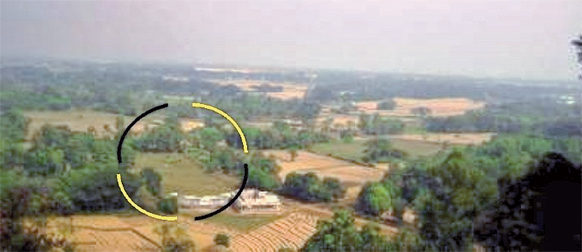Kalinga war prompted the
triumph of Buddhism and Peace
by Padma Edirisinghe
That peace shadows the horrors of gruesome war is an inevitable corollary. The
latest sample ,as late as the 1940s, is the peace that followed the Axis Nazi
tussle in the West, initially voiced so aptly by one of our own Presidents, ‘
violence never appeases violence, that it is mercy that orchestrates the miracle
of peace’, popularly known as the San Fransisco Declaration . The whole debacle
that preceded this was known as the Second World War.
But as early as 3rd century BC, wrapped up in the mists of bygone times, the
monstrous debacle had been staged , this time in the great sub Continent of
India, then a conglomeration of myriad states.
|

The dhauli hill, where Kalinga war was fought in Orrisa. Pic
courtesy:www.slideshare.net |
Asoka, a Prince in the imperial line of India , like Alexander the Great of
Macedonia was frenzied with a desire to own the maximum of land a crowned head
could control. He succeeded in his desire to a great extent but one state on the
eastern coast of India proved a stumbling block by its desire to maintain its
sovereignty. This provided the background to the famous Kalinga war. So Kalinga,
today known as Orissa or Odhisha burst into the rolling pages of world history
as the carpet land that proved the adage that finally ‘war begets peace’.
CHandashoka , or Ashoka the cruel, himself was transformed into DHarmashoka ,
the prince of Dhamma. The latest newsletter of the Indian Cultural Centre puts
it colourfully, that the natives of Kalinga, refusing to forsake their freedom,
turned the river waters red with blood. But although Asoka won the war, he was
left with remorse with the knowledge that to satiate the ambition of a single
individual, tens of thousands of humans had been killed and their corpses lay
prostrate to articulate the misery and agony.
Here is a relevant quote from the 13 th rock edict put up by King Asoka .
“One 100 and 50,000 men were carried away captive from that country as many as
one hundred 1000 were killed in action and many times that number perished.”
Reminiscing over the terrible devastation CHandashoka turned into DHarmashoka,
thus creating a topsy-turvy of the negative picture.This was a politico mural
Adolf Hitler presented centuries later in the aftermath of his almost universal
massacre of his foes. Devastated, he shot himself and ended his life, but King
Asoka was a million times more positive.. He was born in a period still closely
shadowed by the teachings of a great apostle of peace and he sought solace by
spreading the message of peace all over Asia and even further, by holy couriers.
Quoting the source again:
“Kalinga was conquered at last but the conquest changed the heart of the
conqueror. This change in Asoka changed the course of religion and cultural
history not only of India but also of the whole world”
The source, incidentally draws attention to the Kalinga Rock edict written in
Brahmi script which not only focuses on the massacre of human lives in the
thousands but gives guidelines on how to rule justly and non violently. Here is
the famed declaration, that is also supposed to be a medley of instructions to
the Mauryan viceroy placed at Thosalee , capital of ancient Kalinga to rule the
people along these lines. .
“All men are my children and just as I desire for my own children that they
should have bliss and happiness both in this world and the other world , so also
I desire the same for all men”. (Men here connotes humanity , obviously
including the women.) |

